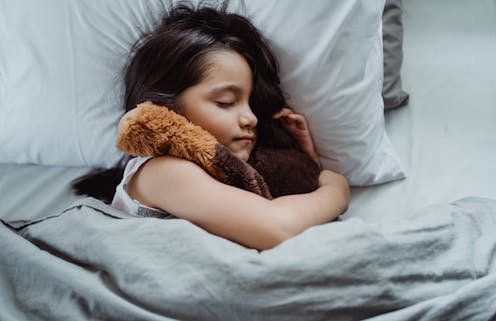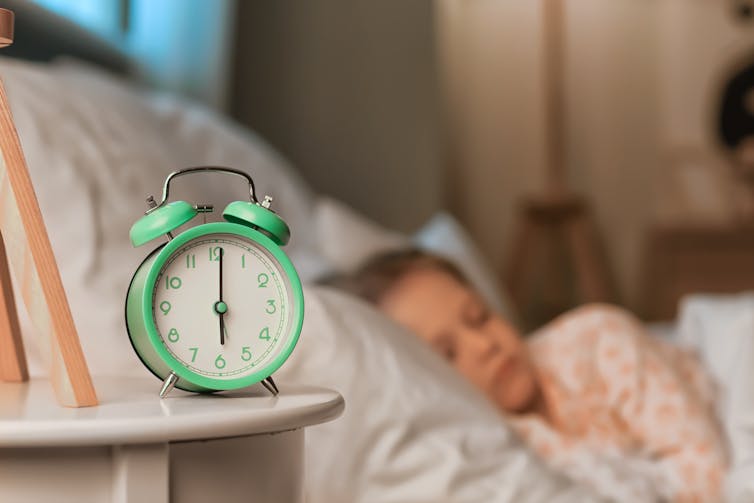
Getting a good night’s sleep is important for children’s learning and development. When young people don’t get enough sleep, it can impact their mood, school performance, health, and behaviour.
The impact of sleep on quality of life is a force everyone can relate to. For children with neurodevelopmental conditions such as autism and attention-defect hyperactivity disorder (ADHD), a poor night’s sleep can have even more far-reaching impacts on not only the child’s mental health, but on the mental health and stress levels of parents, too.
Up to 80% of autistic children have trouble with their sleep. Common behavioural difficulties parents report include dyssomnias (problems going to sleep), parasomnias (problems waking up overnight), and early morning waking. These problems tend to persist if they are not treated effectively.
Behavioural interventions are an important first step in the treatment of sleep problems for children. In particular, our research has found sleep problems can be effectively treated in autistic children when sleep strategies are tailored to children’s needs.
And the techniques can be useful for all families struggling with children’s poor sleep.
Read more: Sleep problems that persist could affect children's emotional development
Our research
Sleeping Sound is program that tailors strategies to the young person’s sleep needs and preferences. Originally created to help manage sleep problems in children with typical development, Sleeping Sound has been adapted over the past decade to help children with autism and ADHD.
We conducted a randomised controlled trial – the gold standard for determining whether an intervention works – with 245 autistic children aged 5–13 years and their parents. Families were randomly allocated to the intervention group (receiving Sleeping Sound) or the control group (not receiving Sleeping Sound).
Families in the intervention group participated in two 50-minute face-to-face sessions and a follow-up phone call with a paediatrician or psychologist. They received an assessment, sleep education, and personalised practical strategies that were individualised to their child and family.

What did we find?
We found families who received the Sleeping Sound intervention had fewer sleep problems compared with families who did not receive the intervention. These benefits in child sleep were still present up to one year later.
We also saw positive flow-on effects for children (improved quality of life, better emotional and behavioural functioning) and their parents (reduced stress levels, improved mental health and quality of life).
Parents of autistic children said family support and consistency with strategies were important. This is consistent with the future direction of personalised autism health care, which recognises the unique strengths, needs, and circumstances of autistic people and their families.
While the program is still in its trial phase and isn’t available to families in the wider community, it uses strategies that all parents can adopt to improve their children’s sleep.
Tips to improve kids’ sleep
Parents can help their children get a good night’s sleep by using the universal approach to sleep readiness and behavioural sleep strategies. This includes:

- setting a regular bedtime and waking up time
- creating a safe, comfortable sleeping environment (cool, quiet, dark, screen-free)
- following a regular bedtime routine that is calm and sleep-inducing
- avoiding caffeine, electronic devices and excitement before bed
- encouraging physical activity during the day
- avoiding exercise one hour before bed.
Read more: Regular bed times as important for kids as getting enough sleep
What if good sleep remains elusive?
In addition to practising healthy sleep habits and establishing a bedtime routine, parents can try out different behavioural strategies that might help their child. These include:
The checking method
This strategy can be helpful when children need a parent in the room to fall asleep or find it hard to stay in their bedroom.
Put your child to bed but promise to come back and check on them. Visit your child at regular intervals in the night to check on them and reassure them. Gradually stretch out interval times.
Checks should be boring and brief (around one minute).
Bedtime fading
This strategy can be helpful when children are unable to fall asleep at the desired bedtime.
Temporarily adjust bedtime to when your child is naturally falling asleep. Gradually bring bedtime forward in 15-minute increments every few days until desired bedtime is reached.
Relaxation training
These strategies can be helpful when children are anxious at bedtime or have difficulty falling asleep.
Teach your child progressive muscle relaxation. Encourage your child to lie down with their eyes closed and then tighten and relax all the muscles in their body, one after the other.
Teach your child controlled breathing. Help them learn to take long, slow breaths in through their nose and out through their mouth.
Encourage your child to write or draw the things that worry them during the day and put them away in a “worry box”.
Children may experience one or more sleep problems, so a combination of behavioural sleep strategies may be required. If you’re worried about your child’s sleep, or if sleep problems persist, consult your paediatrician or GP for further guidance.
We are currently recruiting for our new study evaluating the Sleeping Sound intervention via telehealth, through the Krongold Clinic at Monash University. If you are a parent of an autistic child aged 5–12 who is experiencing sleep problems and would like to find out more, visit our website.
Nicole Rinehart receives funding from the National Health and Medical Research Council (NHMRC; project grant no APP1101989). She is a board member of Amaze and a clinical psychology consultant at the Melbourne Children's Clinic. The current Sleeping Sound telehealth study is funded by Jonathan and Simone Wenig and the trial is being conducted at the Krongold Clinic at Monash University. She also receives philanthropic funding from the Moose Foundation, Ferrero Group Australia as part of its Kinder + Sport pillar of Corporate Social Responsibility initiatives, MECCA Brand, and the Grace and Emilio Foundation, as well as funding from the NSW Department of Education.
Nicole Papadopoulos received funding from the National Health and Medical Research Council (NHMRC; project grant no APP1101989). Nicole Papadopoulos also receives philanthropic funding from the Moose Foundation, Ferrero Group Australia as part of its Kinder + Sport pillar of Corporate Social Responsibility initiatives, MECCA Brands, Wenig Family; and industry partner funding from the Victorian Department of Education, and NDIS to conduct research in the field of neurodevelopmental disorders and inclusion.
Emily Pattison does not work for, consult, own shares in or receive funding from any company or organisation that would benefit from this article, and has disclosed no relevant affiliations beyond their academic appointment.
This article was originally published on The Conversation. Read the original article.







